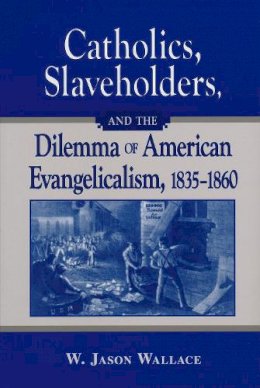W. Jason Wallace is assistant professor of history at Samford University.
“This is an excellent study that examines the religious tensions within antebellum religious groups . . . Wallace’s work provides a broader understanding of the antebellum religious climate, particularly with the inclusion of Catholics. This volume is highly recommended for students of nineteenth-century American religious history.” —Religious Studies Review “. . . a welcome addition to the growing body of scholarship on evangelicals and politics in the antebellum era. By giving equal attention to the Catholic vision of history, Wallace counterbalances the more familiar nativist and evangelical versions of the role that Protestantism and the United States played in historical progress.” —The Journal of Southern History “. . . his study addresses important questions regarding the ways in which antebellum intellectuals and evangelical leaders struggled about what should substitute for a state religion. The power of religious leaders to advance the notion of a Christian or Protestant America and the belief that civic morals depended on religious ideas had, as Wallace makes clear, mixed consequences in the nineteenth century.” —Journal of Interdisciplinary History “Wallace’s excellent Catholics, Slaveholders, and the Dilemma of American Evangelicalism, 1835–1860 examines the interaction among three groups, northern evangelicals, southern evangelicals, and Catholics, during the antebellum period to reveal the failure of American Protestants to transform the United States into ‘an evangelical republic.’” —The Catholic Social Science Review “W. Jason Wallace’s fine monograph—drawn from the antebellum religious press, books, and sermon literature—explores the significance of this infusion of Irish, German, and French Catholics in the cauldron of American Protestantism after the Second Awakening. Set against the backdrop of the sectional discord involving slavery and competing visions of nascent nationalism, this increasingly vocal Catholic presence helped shape the antebellum debate over God and country.” —The Catholic Historical Review ‘This study contributes to our understanding of the controversy over slavery among American Protestants by adding a crucial third perspective on the problem—that of European and American Catholics. The desire of northern Protestants to create a unified evangelical republic, W. Jason Wallace reminds us, foundered on both southern slavery and Catholicism. The study makes a convincing case that our understanding of the controversies over slavery among American Protestants can be deepened by examining the Catholic context of these arguments.” —Journal of American History “In this trim, well-written work, W. Jason Wallace offers a theologically informed account of the important role evangelicals played in the antebellum conflicts over slavery and Catholic immigration.” —Journal of Church and State “In five crisp chapters, Wallace . . . outlines how Catholicism debated the hegemonic discourse of Protestant-based acquisitive capitalism, articulated a traditional accommodation to slavery as a product of human sin, and asserted its own historic and ongoing contribution to the discussion of social morality and the proper sources of the Christian life.” —Choice “For those who like their history complicated, Jason Wallace’s book should be at the top of their reading list. In this book Wallace takes the familiar dispute between abolitionist and pro-slavery evangelical Protestants and throws in Roman Catholicism, not only as an intriguing voice in the debates about slavery but also as a related subject of debate, with Roman Catholicism representing to evangelicals another form of slavery. The result is an episode that opens the question of slavery to the larger political and economic context of European and American debates about freedom and tyranny after the eighteenth century revolutions. Wallace argues convincingly that these disputes produced no winners, and suggests just as plausibly that the reputed winners—the northern evangelicals—lost as much as they won.” —D. G. Hart, Westminster Seminary California “Despite their obvious differences, antebellum American Catholics and pro-slavery Southern evangelicals had one feature in common: their powerful aversion to Northern evangelicals' transformation of the Christian faith into a crusading gospel of ‘progress.’ By exploring their respective critiques of Northern evangelical theology, with its overconfidence in individual and social perfectibility and its tendency to identify Christianity with American nationalism, W. Jason Wallace provides us with keen insight into American evangelicalism's characteristic dilemmas, many of which still bedevil it today.” —Wilfred M. McClay, University of Tennessee at Chattanooga

